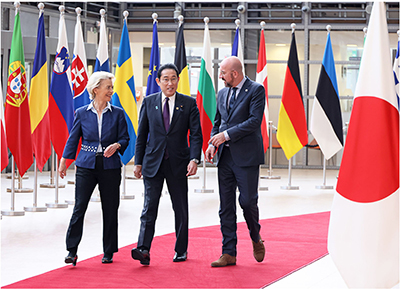Diplomatic Bluebook 2024
Chapter 2
Resilient and Unwavering Regional Diplomacy
Section 5 Europe
1 Overview
<The Importance of Cooperation with Europe, with which Japan Shares Values and Principles>
The European Union (EU) and European countries are important partners for Japan, sharing values and principles such as freedom, democracy, the rule of law, and human rights. It is becoming even more important to strengthen cooperation with the EU and European countries under the recognition that the security of Euro-Atlantic and Indo-Pacific is inseparable in order to respond to challenges to the values and principles to which Japan and Europe attach importance and to defend the free and open international order based on the rule of law in the midst of intensifying geopolitical competition that threatens the existing international order, such as Russia's aggression against Ukraine. In addition, the need for international coordination in addressing global issues such as climate change and infectious diseases has further increased the need for cooperation with the EU and European countries.
European countries pursue common policies across a wide range of fields such as diplomacy and security, economy, and state finance, through various frameworks including the EU. They also play an important role in formulating standards in the international community. The countries also influence international opinion benefiting from their language, history, cultural and artistic activities, and through communication activities utilizing major media organizations and think tanks. Cooperation with Europe is also important for enhancing Japan's presence and influence in the international community.
<Russia's Aggression Against Ukraine and Europe>
In response to Russia's aggression against Ukraine that began in February 2022, severe sanctions against Russia and strong support for Ukraine were continued in 2023. As the holder of the G7 Presidency, Japan showed its leadership to ensure that the G7 unify in promoting severe sanctions against Russia and strong support for Ukraine to stop Russia's aggression against Ukraine as soon as possible. In addition, Japan has shown its solidarity with Ukraine at various levels, including the summit and foreign minister levels, such as Prime Minister Kishida's visit to Kyiv in March, President Volodymyr Zelenskyy's visit to Japan to attend the G7 Hiroshima Summit in May, and the G7 Leaders' Video Conference in December, and has closely cooperated with Ukraine to provide support tailored to the Ukrainian people.
In Europe, Russia's aggression against Ukraine has become one of the most important issues, leading to sanctions against Russia and support for Ukraine. The EU, North Atlantic Treaty Organization (NATO),1 and various countries have been united in strongly condemning Russia. They have imposed severe sanctions against Russia, including financial sanctions, travel bans on individuals and entities and restrictions on imports and exports, and are continuing their solidarity with and support for Ukraine.
For example, the EU provides economic assistance such as macrofinancial assistance, defense equipment support through the European Peace Facility,2 and training of Ukrainian soldiers through the EU Military Assistance Mission in support of Ukraine (EUMAM Ukraine).3 NATO is also working on creating a multi-year plan to assist Ukraine and has stated that it will extend an invitation to Ukraine to join NATO if its member countries agree and conditions are met. The United Kingdom (UK) has provided a total of 9.3 billion UK pounds in military, humanitarian, and economic assistance, including the provision of “Challenger 2” tanks, and hosted a conference on Ukraine's reconstruction in June. France has provided humanitarian and economic assistance in addition to military aid totaling 3.2 billion euros, including the provision of cruise missiles and armored and light combat vehicles. Germany decided in January to provide Ukraine with Leopard 2 battle tanks, and has provided military, humanitarian, and economic assistance totaling 24 billion euros.
- 1 NATO: North Atlantic Treaty Organization. For more information, see the MOFA website for details:
https://www.mofa.go.jp/region/europe/nato/index.html
- 2 European Peace Facility: System established in March 2021 to enable the EU to finance military or defense activities under the EU's Common Foreign and Security Policy and to enhance the EU's capacity for conflict prevention, peacebuilding, and strengthening international security.
- 3 EU Military Assistance Mission in support of Ukraine (EUMAM Ukraine): A military mission established by the EU in October 2022 to support Ukraine. It provides training to the Ukraine military.
<Multilayered, Attentive Diplomacy with Europe>
In Europe, the need for values and principles such as freedom, democracy, the rule of law, and human rights, as well as compliance with the rule of law and international law, is being further recognized amidst the response to Russia's aggression against Ukraine. On the other hand, a fine-tuned approach is required that takes into account the diversity of European countries and their respective circumstances. Japan supports a strongly united Europe and conducts multilayered and tailored diplomacy for it. In 2023, with the resumption of in-person visits by dignitaries which had previously been constrained by COVID-19, Japan confirmed close cooperation with European countries, the EU, NATO, and others by actively conducting meetings taking the opportunities presented by visits to Europe by the Prime Minister and ministers, as well as visits to Japan by dignitaries.
In January, Prime Minister Kishida visited France, Italy, and the UK and held meetings with the leaders of these countries, confirming the maintenance and strengthening of the free and open international order, and the strengthening of cooperation in the security field. In addition, in July, Prime Minister Kishida attended the NATO Summit Meeting in Lithuania, as he had done the previous year. He shared with the leaders of various countries the recognition that the security of Euro-Atlantic and Indo-Pacific is inseparable. Next, Prime Minister Kishida visited Brussels, where he held the 29th Japan-EU Summit Meeting and confirmed close cooperation for maintaining and strengthening the free and open international order based on the rule of law.
 The 29th Japan-EU Summit Meeting (July 13, Brussels, Belgium; Photo: Cabinet Public Affairs Office)
The 29th Japan-EU Summit Meeting (July 13, Brussels, Belgium; Photo: Cabinet Public Affairs Office)During the year 2023, Prime Minister Kishida confirmed cooperation with various European countries through means such as holding meetings with the leaders of Albania, Italy, Ukraine, the UK, the Netherlands, Greece, Sweden, the Czech Republic, Denmark, Germany, Norway, France, Belgium, Poland, Lithuania, and Romania.
Cooperation was also deepened in the security field. Foreign Minister Hayashi attended the Munich Security Conference (February) and the Seventh Japan-France Foreign and Defense Ministers' Meeting (“2+2”) (May). Foreign Minister Kamikawa attended the Fifth Japan-UK Foreign and Defence Ministers' Meeting (“2+2”) (November).
With regard to the legal framework in the security field, the Japan-UK Reciprocal Access Agreement (RAA) was signed in January and entered into force in October. In addition, there was an agreement in principle in November on the Japan-Germany Acquisition and Cross-Servicing Agreement (Japan-Germany ACSA).
Furthermore, Japan conducts public diplomacy activities including dispatch of experts, cooperation with European think tanks, and Japan's Friendship Ties Programs “MIRAI” for intellectual and people-to-people exchange that allows young people from Europe to visit Japan. These activities are aimed to promote the accurate picture of Japan and Asia and mutual understanding. Japan is working to strengthen multilayered relations with Europe by sharing information and exchanging views with European countries, organizations, and experts in a wide range of fields, including politics, security, economics, and business.
